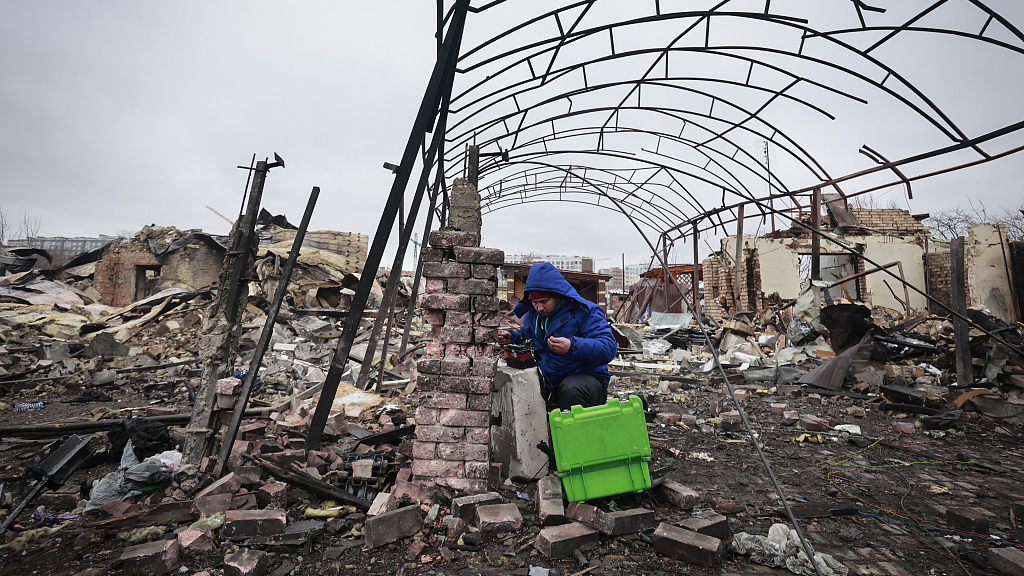01:27

The Kremlin said on Tuesday that Western allegations of Russian forces murdering hundreds of civilians in the town of Bucha, outside Ukrainian capital Kyiv, were a "monstrous forgery" aimed at denigrating the Russian army, while the EU expelled over 150 Russian diplomats in the last 48 hours and proposed new sanctions on Russian coal and shipping.
Italy, Denmark, Latvia, Spain, Sweden and Estonia on Tuesday joined EU allies in expelling Russian diplomats. Kremlin spokesman Dmitry Peskov called the EU's mass expulsions a "short-sighted" move, stressing it will only complicate communication. He added Moscow will inevitably take retaliatory steps.
Since Russian troops withdrew from towns and villages around Kyiv, Ukrainian troops have been showing journalists corpses of what they say are civilians killed by Russian forces, destroyed houses and burnt-out cars.
Moscow has rejected Western accusations that its forces were responsible, suggesting the images are fake or that the deaths occurred after they pulled out.
Russia says fake
Russia casts the evidence of civilian executions in Bucha as a cyclical ploy by Ukraine and its Western backers, who Moscow says are gripped by discriminatory anti-Russian paranoia.
"These are fakes that matured in the cynical imagination of Ukrainian propaganda," Dmitry Medvedev, who served as president from 2008 to 2012 and is now deputy secretary of Russia's Security Council, said of Bucha.
Medvedev said the fakes had been concocted for vast amounts of money by Western public relations companies and "tame" non-governmental organizations. He did not provide specific evidence.
Russia's defense ministry said it had evidence that the 72nd Ukrainian Main Center for Psychological Operations had helped stage such propaganda in a village 23 kilometers (14 miles) northwest of Kyiv as well as in Sumy, Konotop and other towns.
Moscow has also questioned why, if its forces withdrew from Bucha on March 30 and the mayor of Bucha declared the area free of Russian forces on March 31, that the bodies of dead civilians were only shown for the first time on April 3.
"We once again urge the international community: detach yourself from such emotional perceptions and think with your head," Peskov said. "Compare the facts and understand what a monstrous forgery we are dealing with."
Battle in the east
Ukraine on Tuesday said it was bracing for about 60,000 Russian reservists to be called in to reinforce Moscow's offensive in the east, where Russia's main targets have included the port of Mariupol and Kharkiv, the country's second-largest city.
Ukraine's general staff said in a daily update that Russian forces aimed to fully take over the Donetsk and Luhansk provinces claimed by Russian-backed separatists and encircle a group of Ukrainian forces.
Russia is not giving up on its offensive in Ukraine but will try to refocus on completely taking the Donbas region in the coming weeks, NATO Secretary-General Jens Stoltenberg also said on Tuesday.
NATO plans to offer more weapons, EU plans new sanctions
NATO allies will discuss the delivery of more weapons to Ukraine when foreign ministers meet on Wednesday and Thursday, Stoltenberg told reporters.
"We speak about advanced weapons systems. We speak about, for instance, javelins and other anti-tank weapons," he told a news conference, adding that ammunition, medical supplies and "high-end" weapons systems would also be discussed.
According to a speech posted on Twitter by the head of the European Union's executive, Ursula von der Leyen, the European Commission on Tuesday proposed new sanctions against Russia over the Ukraine crisis, including a ban on buying Russian coal and on Russian ships entering EU ports, and said it was working on banning oil imports too.
Brussels is also proposing a total ban on transactions of four large banks that represent a quarter of the Russian banking sector, including VTB, the country's second largest lender.
The EU executive additionally wants to expand the list of Russian products banned in the EU, including vodka.
The proposal from the commission will now be presented to the EU's member states with hopes they will approve it as early as Wednesday.
(With input from agencies)

